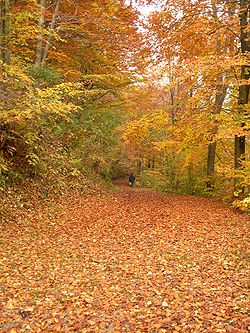Thomas Haynes Bayly
Appearance

Thomas Haynes Bayly (13 October 1797 – April 1839) was a popular miscellaneous writer best known for his songs.
Quotes
[edit]
To die when all fair things are fading away.
- I've now got the music book ready,
Do sit up and sing like a lady
A recitative from Tancredi,
And something about "Palpiti!"
Sing forte when first you begin it,
Piano the very next minute,
They'll cry "What expression there's in it!"
Don't sing English ballads to me!- Don't Sing English Ballads to Me; reported in Hoyt's New Cyclopedia Of Practical Quotations (1922), p. 56.
- We met,—'twas in a crowd.
- We met, reported in Bartlett's Familiar Quotations, 10th ed. (1919). Parodied by Thomas Hood: We met,—'twas in a mob.
- Gayly the troubadour
Touched his guitar.- Welcome me Home, reported in Bartlett's Familiar Quotations, 10th ed. (1919).
- Why don't the men propose, Mamma?
Why don't the men propose?- Why don't the Men propose?, reported in Bartlett's Familiar Quotations, 10th ed. (1919).
- She wore a wreath of roses
The first night that we met.- She wore a Wreath, reported in Bartlett's Familiar Quotations, 10th ed. (1919).
- Friends depart, and memory takes them
To her caverns, pure and deep.- Teach me to forget, reported in Bartlett's Familiar Quotations, 10th ed. (1919).
- Tell me the tales that to me were so dear,
Long, long ago, long, long ago.- Long, long ago, reported in Bartlett's Familiar Quotations, 10th ed. (1919).
- The rose that all are praising
Is not the rose for me.- The Rose that all are praising, reported in Bartlett's Familiar Quotations, 10th ed. (1919).
- Oh pilot, 'tis a fearful night!
There's danger on the deep.- The Pilot, reported in Bartlett's Familiar Quotations, 10th ed. (1919).
- Fear not, but trust in Providence,
Wherever thou may'st be.- The Pilot, reported in Bartlett's Familiar Quotations, 10th ed. (1919).
- Absence makes the heart grow fonder:
Isle of Beauty, fare thee well!- Isle of Beauty, st. 3, reported in Bartlett's Familiar Quotations, 10th ed. (1919). Compare: "I find that absence still increases love", Charles Hopkins, To C. C.; "Distance sometimes endears friendship, and absence sweeteneth it", James Howell, Familiar Letters, book i. sect. i. No. 6, Semper in absentes felicior aestus amantes—"Woman’s heart is ever fonder towards an absent lover", Propertius, II, 33c (tr. G. P. Goold)
- The mistletoe hung in the castle hall,
The holly-branch shone on the old oak wall.- The Mistletoe Bough, reported in Bartlett's Familiar Quotations, 10th ed. (1919).
- Oh, I have roamed o'er many lands,
And many friends I've met;
Not one fair scene or kindly smile
Can this fond heart forget.- Oh, steer my Bark to Erin's Isle, reported in Bartlett's Familiar Quotations, 10th ed. (1919).
- My fond affection thou hast seen,
Then judge of my regret
To think more happy thou hadst been
If we had never met.- To my Wife, reported in Bartlett's Familiar Quotations, 10th ed. (1919).
- I'm saddest when I sing.
- You think I have a merry heart, reported in Bartlett's Familiar Quotations, 10th ed. (1919). Compare: "I can’t sing. As a singist I am not a success. I am saddest when I sing. So are those who hear me. They are sadder even than I am", Artemus Ward, Lecture.
Psychæ (1828)
[edit]Psychæ; or, Songs on Butterflies &c. (Malton, 1828). Only a few copies printed for private distribution.
- I'd be a butterfly born in a bower,
Where roses and lilies and violets meet.- "I'd be a Butterfly", line 1; p. 2.
- Those, who have wealth, must be watchful and wary;
Power, alas! nought but misery brings!- "I'd be a Butterfly", line 13; p. 2..
- Sure it is better, when summer is over
To die when all fair things are fading away.- "I'd be a Butterfly", line 19; p. 2.
- Oh no: we never mention her!
Her name is never heard;
My lips are now forbid to speak
That once familiar word.- "Oh no: we never mention her", line 1; p. 20. Variant: Oh, no: we never mention him!

